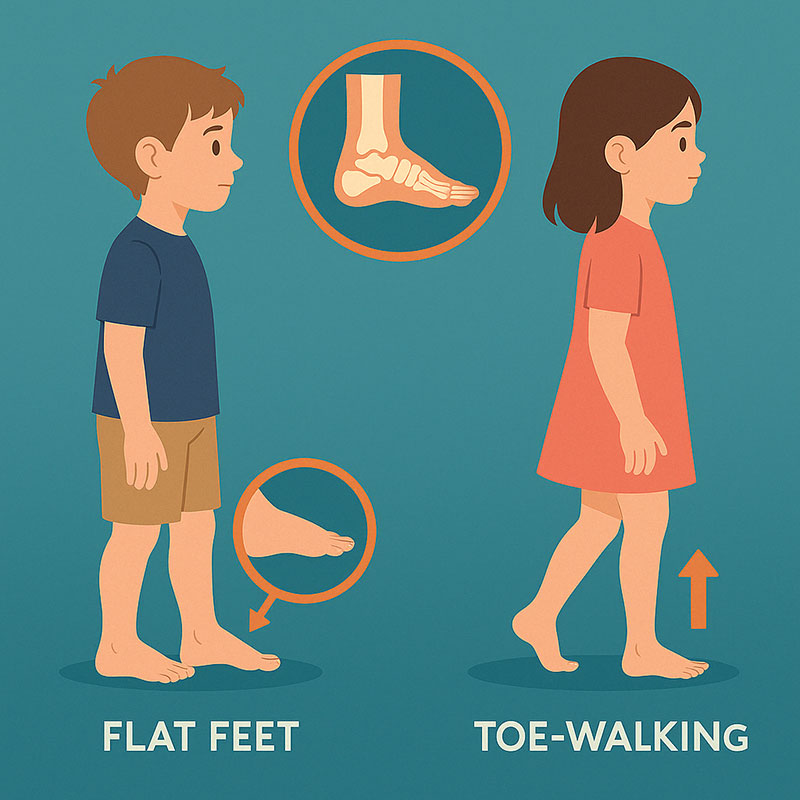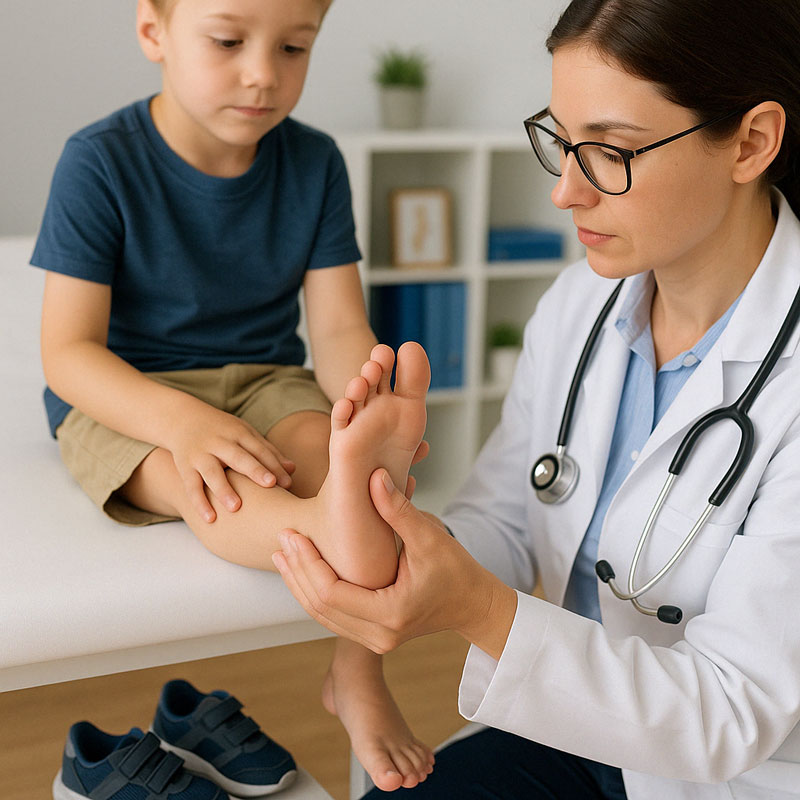Pediatric foot care is essential to ensure a child’s feet develop correctly and to prevent long-term complications. Many foot problems that appear in adulthood actually start in childhood, often due to ignored symptoms or improper footwear. By addressing issues early – like flat feet, toe walking, or arch pain – parents can help their children stay active, healthy, and pain-free.
Foot issues can also affect the knees, hips, and spine over time. If a child compensates for discomfort by walking abnormally, this can lead to poor posture and strain on other joints. Early attention to foot health can reduce the risk of future injuries and orthopedic complications.
What Is Pediatric Foot Care?
Pediatric foot care refers to the diagnosis, treatment, and prevention of foot and ankle conditions in children. Because kids’ bones, muscles, and joints are still forming, they require specialized attention from a trained podiatrist who understands these developmental stages.
This branch of podiatry also involves educating parents on how to monitor their child’s foot development, recognize warning signs, and choose proper footwear. Preventative care, when combined with routine checkups, can go a long way in supporting long-term foot health.
Common Foot Conditions in Children
Many children experience foot or ankle issues at some point. While some are mild and resolve on their own, others need medical attention. Here are a few common conditions:
-
- Flat Feet – Often painless, but can lead to discomfort or misalignment.
- In-Toeing or Out-Toeing – Usually harmless but sometimes requires bracing or therapy.
- Sever’s Disease – A heel condition caused by growth plate inflammation, common in active kids.
- Plantar Warts – Caused by a virus, they can be painful and spread if untreated.
- Ingrown Toenails – Can lead to infection if not properly treated.
- Toe Walking – May be normal in toddlers but could indicate muscle or neurological issues if persistent.
Other conditions include clubfoot, bunions (yes, they can happen in kids), and overpronation. All of these can benefit from early diagnosis and treatment.

Signs Your Child May Need Pediatric Foot Care
Children don’t always express foot pain clearly. As a parent, watch for these warning signs:
- Limping or toe walking
- Reluctance to walk, run, or play
- Frequent tripping or falling
- Complaints of leg or heel pain
- Uneven shoe wear
- Redness, swelling, or skin changes around the toes
Some children may also avoid participating in physical activities they once enjoyed. If they consistently favor one foot or remove shoes frequently, it might be due to pain.
Benefits of Early Intervention
Why is early pediatric foot care so important? Because early treatment leads to better outcomes. Children’s bones are flexible and easier to correct. Intervening at a young age may:
- Prevent chronic foot or leg pain
- Improve mobility and coordination
- Avoid costly and invasive treatments later
- Support healthy posture and balance
- Enhance athletic performance and physical confidence
In some cases, untreated foot conditions may lead to developmental delays or difficulties in school due to physical discomfort. Pediatric podiatrists play a vital role in ensuring kids grow up pain-free and confident in their movement.
Choosing Proper Footwear for Growing Feet
Shoes play a big role in foot development. Here are a few key tips for choosing the right pair:
- Look for flexible soles that support natural movement.
- Ensure the shoe fits with room for growth (about a thumb’s width at the toe).
- Avoid hand-me-down shoes that have molded to another child’s foot.
- Prioritize comfort over fashion – no high heels or narrow toe boxes for kids.
- Opt for shoes with a wide toe box and proper arch support.
It is also important to regularly check shoe size. Children’s feet grow quickly, and shoes that are too small can cause blisters, bunions, or gait issues.
How a Pediatric Podiatrist Can Help
Pediatric podiatrists have advanced training in diagnosing and treating foot and ankle conditions specific to children. At Central Arkansas Foot and Ankle Specialists, we use a gentle, child-friendly approach to provide:
- Developmental assessments
- Custom orthotics for structural concerns
- Treatment for infections or injuries
- Guidance on athletic foot care and shoe fitting
- Preventative care for inherited conditions
We understand how to create a calming environment for children and communicate effectively with parents to ensure everyone feels informed and confident in the care plan.
FAQs: Pediatric Foot Care
When should a child first see a podiatrist?
Children should be evaluated if you notice abnormalities in walking or foot structure, or if they complain of pain. Otherwise, a general check-up around age 4-5 can be helpful.
Are flat feet in children normal?
Flat feet are common in toddlers but should be monitored. If they persist past age 5 or cause discomfort, professional care may be necessary.
Can custom orthotics help my child?
Yes. Custom orthotics are designed to support proper alignment and reduce pain. They are especially useful for children with flat feet, overpronation, or growth-related pain.
What is the best type of shoe for toddlers?
Supportive, flexible shoes that mimic barefoot walking are ideal. Avoid stiff or overly structured shoes unless prescribed by a doctor.
Do children outgrow most foot problems?
Some mild conditions resolve on their own, but not all. It is important to monitor symptoms and seek guidance to ensure your child isn’t experiencing preventable discomfort.
Prioritize Your Child’s Foot Health Today
Your child’s feet are their foundation – supporting them through play, sports, and daily activities. Investing in pediatric foot care now can prevent discomfort and costly problems in the future.
At Central Arkansas Foot and Ankle Specialists in Conway, we provide compassionate, full-service podiatry care tailored to children. From developmental checks to treating common conditions, our team ensures your little one stays happy, healthy, and active. Call (501) 483-0900 to schedule a pediatric foot evaluation today.

